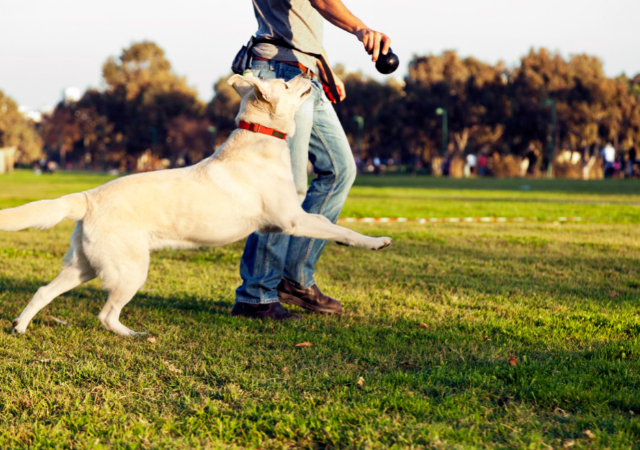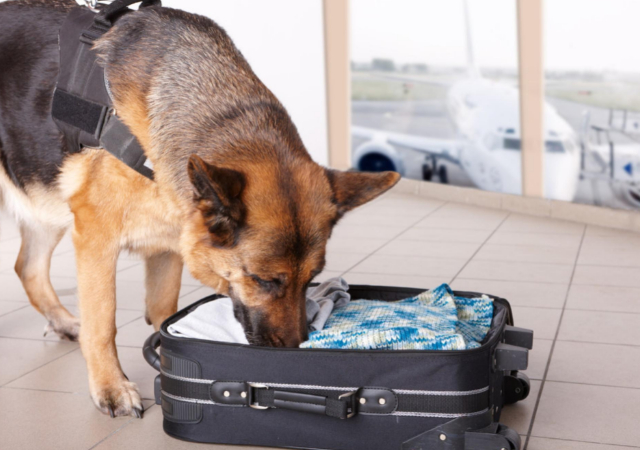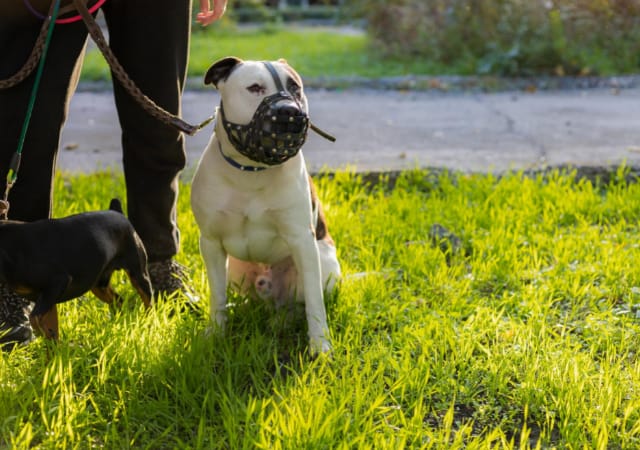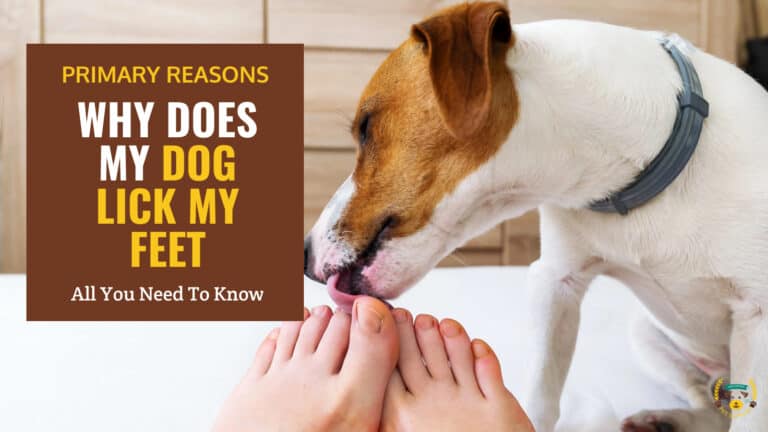11 Possible Reasons Why Dogs Bark at Nothing
Last updated: March 28, 2024

Summary
- Dogs may bark at things they are afraid of, such as strange noises, people, or objects.
- Dogs with stranger anxiety may bark at people they do not know.
- Dogs may bark when they are hungry to let their owners know that they need food.
- Dogs may bark to defend their territory from other dogs or animals.
- Dogs may bark to alert their owners to a potential threat.
- Dogs may bark to get their owners' attention.
- White noise can help to reduce barking.
- Divert your dog's attention with a toy or treat.
- Occlusion muzzles can make it difficult for dogs to breathe and drink water.
- Shock collars can be painful and ineffective for reducing barking.
- Bark collars can be uncomfortable and ineffective for reducing barking.
- Shouting can make the problem worse.
Dogs bark, it may be difficult to tell why they do it. They often seem to be madly barking at absolutely nothing, and you may wonder if they're really insane or just channeling some strange powers. You don't need to worry about them; they're perfectly normal.
All animals have senses that humans do not; therefore, all of them perceive things differently than we do (especially when it comes to smells). Dogs can sometimes get into trouble if they're persistent about having something that really needs them to bark. Their reasons could stem from needing to communicate something vital or just because no one ever stops them from doing so. If you want to help your dogs get rid of their unexplained barking, there are plenty of exercises to keep them physically and mentally active or you can hire an animal behaviorist with experience training dogs.
Dogs Have Exceptional Senses As Compared to Humans

They are dogs for a reason. They can sniff and sense things in their surroundings much better and quicker than their human masters. This is why dogs are trained to alert their owners of danger by barking. They are able to warn us of any potential threats.
Higher Hearing Sense
A dog's sense of hearing is superior to our own. It can hear sounds we cannot and noises we would miss out on. For instance, it can hear the sound of a car coming down the road while we wouldn't notice anything.
A dog can hear sounds at a higher frequency than we humans can. Sound frequencies above 20kHz are known as ultrasonic waves, which human beings cannot detect. However, dogs can hear such sounds. Many dogs are known to detect the whispers of human beings. They do this by moving their ears to concentrate on the exact source of the sound.
So, your dog is not always barking at nothing. It could have heard something you haven’t.
Excellent Sense of Sight
Dogs see better than we humans do. They can see objects that we cannot. They can spot a cat hiding behind a bush while we would never see it.
Nature is wonderful, especially with animals in the wild and particularly dogs. We humans lack a reflective layer in our eyes (behind the retina), which makes our night vision poor. Contrarily, you might notice glowing eyes in the dark in dogs and other animals. That is because of the presence of Tapetum Lucidum (the lining behind the retina). This reflective lining makes it possible for a dog to see things in the dark that our bare eyes cannot.
Next time your dog barks, especially in the dark, believe your waggy-tailed buddy; it might have seen something which you haven’t.
Greater Sense of Smell

A dog's olfactory receptors are unmatched. They are more sensitive to smells than ours. A dog can smell almost 50 times better than an average person. That means a dog can pick up on scents we cannot. For example, a dog can smell blood long before we can. They can even detect the scent of a predator before we even know there's danger around us.
This heightened sense of smell also explains why dogs might find our feet particularly interesting. Our feet sweat, and this sweat contains information about where we've been and what we've done, all readily available for a curious canine nose.
The sense of smell in dogs can not be challenged. According to research, almost 40% of a dog's brain is attributed to the sense of smell. That's why they are great at sniffing bombs, blood, and whatnot. That's not all. Dogs can even detect ailments like cancers and tumors way before those high-end machines do.
11 Reasons for Your Dog Barking at Nothing?
You have a dog for a reason. Be it your love or necessity for the species. Barking dogs seldom bite—besides being a threat to bite behind a dog’s bark, there’s more to it; you should notice a barking dog and try to get to the root cause of it. There can be multiple reasons for such behavior. Check out the common reasons for different types of barking below and find a solution for it.
Fear
Fear is usually the main reason why dogs bark. It may be something strange. They might become fearful of what's outside or inside their homes and bark. So, distant noises, even a truck passing by the road or the horn being honked can be a threat to your dog, and to manage the threat, it can start barking.
To rule out the barking due to fear is easy. First, your dog will have its tail tucked between its legs and rotate its ears backward.
To keep your dog away from such a situation, when outside, you might want to avoid noisy environments, such as construction sites and busy streets, at specific times. Inside, you should try to keep your dog away from areas where it feels threatened.
Playfulness
When playing, dogs will bark to show off their skills. They'll also bark to let others know that they've done well. But, it's not just about showing off. They do it to get attention and to ensure that people know they're doing well.
If your dog is playful, it will have happy barks too. You need to understand its needs and give it enough space if it wants to play all day. On the other hand, you shouldn't restrict its movements unless it's necessary.
Separation anxiety

Dogs are pack animals. Like most living beings, separation anxiety might become the reason of your pet dog’s compulsive barking. Dogs are called loyal animals for a similar reason. They cannot accept separating from their human caregiver or live-in partner.
The American Society for The Prevention of Cruelty to Animals (ASPCA) helps us in identifying the dogs with separation anxiety symptoms [1]. According to them, a dog in distress (due to the stated reason) might start destroying the house and its furniture and urinate or defecate outside the designated place.
For such behavior, a dog behaviorist may help you out and take your dog out of this situation.
Stranger anxiety
Dogs tend to bark at strangers. When they encounter someone new, they may feel uneasy. To calm them down, you must introduce those strangers to your dog and ask the person to reward your dog with treats when it stops barking. Even a gentle pat can act as a treat for your dog.
If your dog starts barking at outsiders, you should consider taking it to a trainer. A good trainer would help you train your dog to accept strangers. For example, dogs living alone may bark to let people know where they are. It's normal for puppies to bark when they first meet new people, but this should stop after about six months.
Hunger
Your dog may bark because it's hungry. It may be trying to call your attention and make you remember its presence. If you do not listen to its barking for hunger, it may misbehave and even get on your kitchen table to grab the food it likes. It might want that tasty treat once again which you gave it last week. So keep providing the food and water; rest assured, your dog will not bark for this reason.
Excitement
Your dog may bark or even bite when there is an issue of excitement in its life. Maybe it's new food or accessories that you bought for it. It could be a meet-up with another dog during a walk when yours gives an excited bark. You might experience its exciting barking on anything that makes its oxytocin level spike.
Medical Conditions
If your dog is sick, it may bark excessively. Its throat may get sore, and its tongue may swell. Other medical conditions which may cause cognitive dysfunction are also generally observed.
If you suspect a medical condition is causing your dog's barking, it's important to consult a veterinarian for diagnosis and treatment. For instance, skin conditions like mange can cause significant irritation, leading to barking. There are also home remedies for dog mange options you can discuss with your vet to alleviate the discomfort and reduce barking.
Territorial Barking

When a dog barks at nothing, it's trying to protect the territory, and we call it "territorial barking." It wants to make sure that no intruders enter its home. For example, if any wild animal like a wolf or even a squirrel passes by its territory, it might start barking. You should try to teach your dog that excessive barking is not encouraged.
Alarm Barking
Alarm barking is a sub-type of barking in situations that make the dogs restless. They may feel alarmed. It could be their superior senses of smell or hearing at work. It is different from territorial barking in that a dog may bark or alarm its owner at any location, not only at its home or yard.
Attention
Your puppy may be bored or lonely if it is barking for attention. Make sure you provide enough distractions for your dog to stay busy, like chew toys or bones to play with.
You can identify a dog barking to seek attention by making eye contact. If it still barks at looking at you, then the reason is definite- It is barking out of loneliness.
Needs Comfort

Give your pet dog a special massage to comfort it. This is especially essential if your pup is fearful or overexcited. You need to acknowledge its concern or voice being heard.
How To React To Dog barking?
This portion will help you as pet parents to control your emotions when you see barking in dogs that don't have an apparent reason.
Try To Reach To the Reason For Barking
Yes, for the above-stated reasons, some of which can be easily identified as the cause of your dog's barking. Like fear barking, it will be easily recognized by observing its tail and ears. So is the attention-seeking barking; your dog will talk to you through its eyes. Taking care of the mental health of your pet helps. Your dog is a social animal; it can bark at times when left alone.
See a Vet
An appointment with a vet is the most suitable option for handling your dog's barking. A veterinary practitioner might help you out in deciphering the cause of barking. For example, it could be an injury, pain, or just age that is causing your dog to bark. So, keep noticing the pattern of barking of your dog and let the vet do the rest.
White Noise Helps!
Knowing your dog's exceptional sense of hearing, white noise is the best bet for it to calm down. White noise is some minutes of noise or music identified to relax or help the listener sleep, whether a human or a dog.
This type of noise masks other unavoidable noises, especially at night, like a neighbor playing with their furniture or just a fan's noise. It helps your intelligent pet zone out of other unnecessary voices that trigger its fear or threaten it. You can either play the YouTube version or get a white noise machine for your dog.
Here’s a quick link to an amazing 10 minutes for your pet dog.
Divert its Attention
Another DIY or first-aid activity for a barking dog is diverting its attention. You can take it to exercise, a trainer or just a running session might be sufficient. Your dog will probably forget about the useless barking and be happy with your companionship.
What NOT to Do to Treat Dog Barking At Nothing?
This is another important thing to pay attention to while dealing with your barking dog. You should be looking after them equally like we do for our human children. Fulfilling their needs will put you and your dog at ease.
Occlusion Muzzles
Occlusion muzzles are one of the most brutal instruments I have ever encountered. They must not be used regularly and for long periods of time. They may negatively affect your dog’s breathing. It would be best if you only use them when your dog has a severe behavioral threat and its barking habits may convert into biting accidents.

While occasional use of an occlusion muzzle might be necessary in extreme cases, it's crucial to be aware of the potential health risks associated with these devices, especially regarding impaired breathing.
If you're concerned about excessive panting or labored breaths in your dog, even outside of muzzle use, consider exploring our informative guide on why is my dog breathing heavily for deeper insights into potential underlying causes and guidance on when to seek veterinary attention.
Shock Collars
Most of the time, you would seek help from an online source for your incessantly barking dog, and a pop-up of getting these instruments like a shock collar for your dog would appear. But you should strictly ignore them. They are not suitable for a healthy dog. They may cause an itchy throat and will subsequently make your dog aggressive.
Bark Collars
A big NO for barking collars for your waggy-tailed champ. If you can't stand a dog's barking or, as you perceive, tantrums, you better drop the idea of keeping it as your pet and ask someone else to adopt this loyal being. Bark collars may produce ultrasonic waves or a citronella mist, which your pet doesn't like. Instead of making them control their barking behavior, these intelligent beings would learn to dodge the stimuli quickly.
Shouting
Never shout at your dog for barking. It will perceive your shouting as joining it in the barking business. Instead, you should calmly behave while controlling your pet. If the barking is not due to pain, hunger, or communication, you should listen to it and do some basic patting. If you think your dog is there to bark for attention only, you may ignore it but try not to shout. Using the training techniques to stop your dog from barking on your "quiet" cue is a success.
Reward On Not Barking
If you want to treat your dog's barking behavior by yourself, then follow our advice. The moment your dog stops barking or acts upon your "quiet" cue, you should reward it with a delicious treat, a toy, or even a word of praise and petting, which would further train it to keep calm and stop barking at nothing. One thing to keep in mind is to avoid noisy treats and toys for your dog. They can trigger its hearing sense, causing it to start barking once again.

Final Thoughts
If you haven't encountered a pet tantrum in your entire life and it's the first time your neighbor has complained about your dog's aggressive behavior and constant barking, you should look into the reasons for the distressed state of your companion animal. A dog's bark might be a form of communication indicating something serious. It could be a threat, pain, or an attention-seeking stunt. Whatever the case, your furry friend needs you to listen to it.
Treating your therapy animal well will ultimately improve the quality of life for both of you. According to research[2], petting and taking good care of a pet dog raises the levels of oxytocin—the happy hormone—in both of you. Moreover, it is also proven that pets are great stress relievers.
In the article above, we have tried our best to help you with the reasons for and how to cope with the unnecessary barking of your dog.
Even though they are your best companion animals, they are dogs, and you, as a pet person, must keep in mind that dogs bark!
References:
1- ASPCA, Separation Anxiety, https://www.aspca.org/pet-care/dog-care/common-dog-behavior-issues/separation-anxiety
2- Hopkins Medicine.org, The Friend Who Keeps You Young https://www.hopkinsmedicine.org/health/wellness-and-prevention/the-friend-who-keeps-you-young#:~:text=Research%20has%20shown%20that%20simply,that%20bonds%20mothers%20to%20babies).






